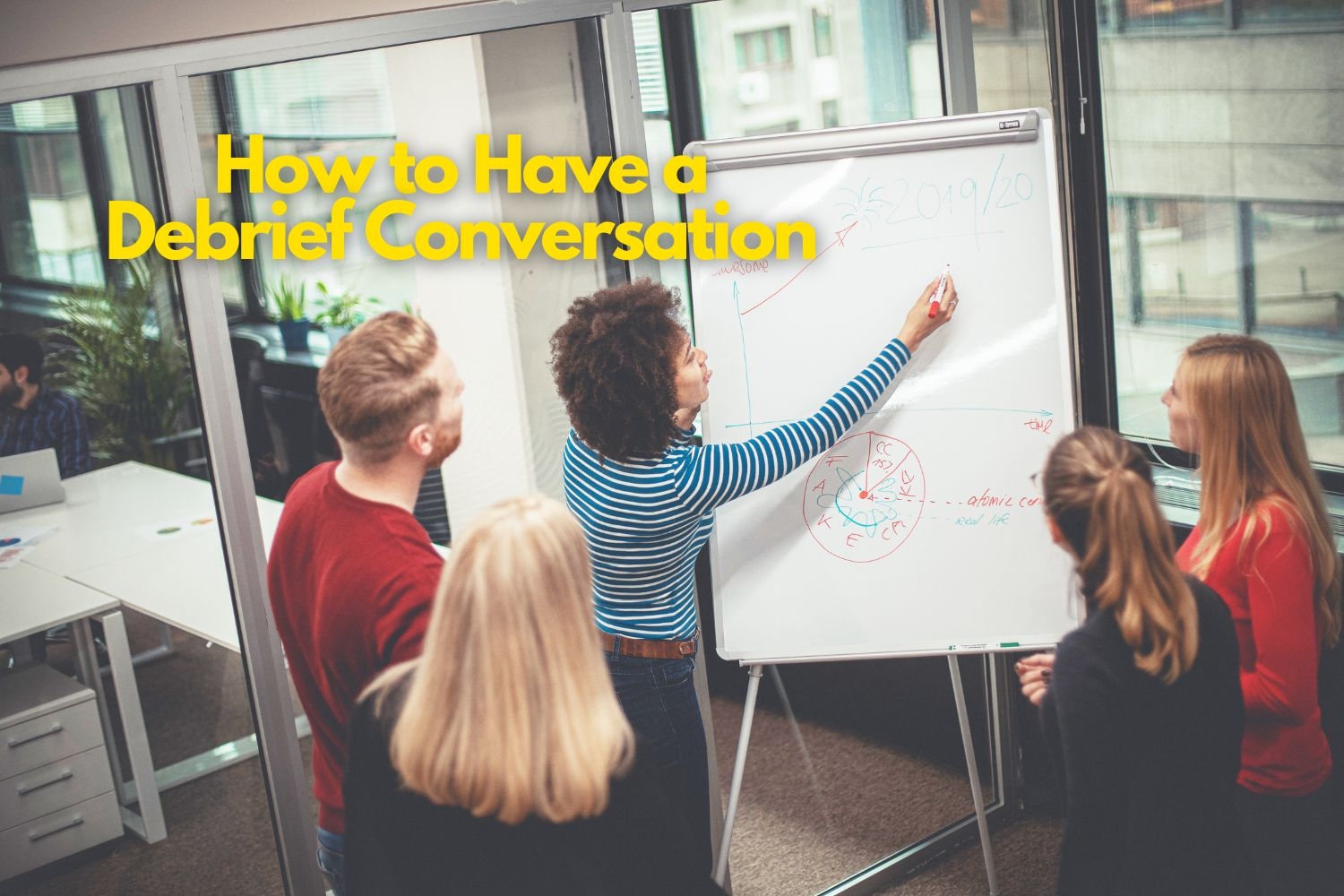How to debrief, well, …anything

In the heat of the moment, everyone has a comment (or 15) about the workshop/event/meeting they are experiencing (usually about the bad coffee). A week later, at the official debriefing meeting, the comments have dried up and no one really has anything to share.
Don’t waste an opportunity for real feedback.
When a debrief conversation doesn’t work, it usually goes something like this:
Person #1: So, what did everyone think of last week’s workshop?
Person #2: I thought it went well, for the most part.
Person #3: It was kind of long.
Person #1: Anyone else?
The rest of your team: [crickets].
Ask questions in this order: objective, reflective, interpretive, and decision.
There’s a better way to have a more thoughtful conversation that will build on successes, address weaknesses, and ensure everyone feels heard but not hurt.
Meet ORID*. ORID isn’t a different language, it an acronym that stands for Objective, Reflective, Interpretive, and Decision. ORID is a method of focussing a conversation – and it WORKS, every time.
Begin by deciding the topic for discussion. It might be an event debrief or a need to make decisions based on a report. Keep the topic simple, 5-10 words.
Let’s use an example scenario about attending a networking meeting the week prior.
Example Discussion Topic: Our attendance at the ABC Networking Meeting.
Step #1, OBJECTIVE Questions
The meeting chair begins by asking for comments that are objective. Keep things factual and observational. Use the five senses as a guide.
What did you see?
- The meeting was in an old school
- The classroom was large with lots of tables in a circle
What did you hear?
- I heard presentations from two guest speakers
- I heard people talking during the presentations
Who participated?
- The co-chairs were Jane and John, from the public school board
- There were participants from 15 different community groups
What time of day was it held?
- The meeting began around 10 AM, after a previous meeting that only some of the participants attended
- The meeting finished before Noon
Step #2, REFLECTIVE Questions
This step allows folks to talk about reactions and associations. Don’t share judgement or implications at this step.
What was your gut reaction?
- Watching folks arrive from the prior meeting made me feel left out
- One of the co-chairs knows me but called me by the wrong name throughout the meeting
What were the high points and low points?
- I finally met the new director of a community group I’d been trying to meet
- There were so many side conversations it seemed people were disinterested
What excited you?
- I was excited to share more information about our organization and the work we do
- I was excited to meet other community groups
What frustrated you?
- No one seemed very interested in each other or the presentations
- Several people thought I worked for a different organization and seemed confused
- No one stuck around after the meeting to chat
Step #3, INTERPRETIVE Questions
This step helps to draw out meaning, values, or significance from the previous steps. Ask questions about why something might be important.
What can you conclude from your experience?
- The meeting seems unimportant to the folks who attend the first meeting
- Participants didn’t take the meeting seriously
What seems to be missing?
- The meeting didn’t appear to have a clear purpose
- Our group may not be the target audience as we aren’t finding meaning in attending
What have you learned from this experience?
- We aren’t learning enough to warrant attending
- We are more interested in the other groups who attend than the topic of the meeting
What value did you receive by attending?
- Meeting the other groups
- Our organization was valued enough to be invited to attend
Step #4, DECISION Questions
This final step before the discussion ends, helps to draw resolution, consensus, and next steps. As the conversation wraps up, it identifies what must be done to build on the information collected in the previous steps.
What needs to change?
- We need to stop attending this meeting
- We need to make more of an effort to connect with fellow community groups one on one
What is our organization committed to do?
- We need to clarify the purpose of the meeting with the meeting organizers – perhaps we don’t understand
- We need to determine if we will withdraw from this networking group
What is the priority?
- Learning the intended meeting purpose
- Making connections with other community groups
At the close of the discussion, do these 3 things.
- Write down your decisions from the final step
- Record who will handle any assigned tasks
- Record when they will report back
Rely on the order of the questions to create a more natural conversational flow.
Using the ORID question packages, helps a group to debrief any workshop/event/meeting. The objective questions are simple enough that anyone can blurt out an answer, because factual observations, like the tablecloths were navy blue, are easy to make and rarely intimidating. That first set of questions gets the conversational ball rolling and the rest of the questions flow much more easily from there.
There is no need to make a debrief conversation hard. Groups can more easily observe, react, and determine changes when the conversation flows, naturally.
Paste this list into your own cheat sheet.
The easiest way to remember to use the ORID questions is to keep them at your fingertips. Here is a list you can copy/paste to create you own cheat sheet. Tuck it in the back of your day timer, or meeting notebook.
Step #1, OBJECTIVE Questions
- What did you see?
- What did you hear?
- Who participated?
- What time of day was it held?
Step #2, REFLECTIVE Questions
- What was your gut reaction?
- What were the high points and low points?
- What excited you?
- What frustrated you?
Step #3, INTERPRETIVE Questions
- What can you conclude from your experience?
- What seems to be missing?
- What have you learned from this experience?
- What value did you receive by attending?
Step #4, DECISION Questions
- What needs to change?
- What is our organization committed to do?
- What is the priority?
Debriefing a meeting/workshop/event is important to determine successes, challenges, and future directions. That conversation helps a non-profit grow and deliver better programs and services.
Thanks for taking the time to read my ideas. My mission is to take the mystery out of running a small non-profit. If you know someone who needs to read this, why not grab the link, and share it with them. Let’s work together to make a debrief conversation easy.
-Christie
…
Hi, I'm Christie Saas, former board member, current Executive Director, and non-profit volunteer. I remember well, those early years when I lacked the training, the confidence, and the work-life balance to focus on becoming the best non-profit leader I could be.
Fast-forward past many bumps in the road, lessons learned, and you’ll find me still in the trenches, but a little wiser, a little calmer, and a whole lot happier. I love my work and I want to help you love yours too.
I created ChristieSaas.com to give you tools, tips, and templates to remove the mystery of learning to run a small non-profit. If you’re a brand-new non-profit leader, or a little more seasoned, someone who’s looking to make a meaningful contribution and still have time for a full life away from the job, you’re in the right place.
© Christie Saas 2022 All Rights Reserved
…
Want to learn more?
Start with one of my free resources.
…
*I first leaned about ORID while taking Group Facilitation Methods from ICA Associates Canada. I strongly recommend taking as many ICA training programs as you can afford, and if possible, start with Group Facilitation.
ICA Associates offers on-line training if you can’t find something in a near-by community. I’ve taken both in-person and on-line training. Both are excellent.
If my research is correct, ORID was developed by Laura Spencer of the Institute of Cultural Affairs, USA, and further developed by R. Brian Stanfield in his book The Art of Focused Conversation.


